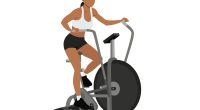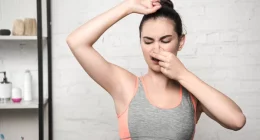
One Specific Exercise Can Stop You From Overeating, Science Says – We’ve all been there before: The food on the plate is so darn delicious that it’s difficult to stop eating. Whether it’s simply a weeknight pizza situation and you can’t stop at one or two slices or dessert after dinner and you go in for a second (and third) cookie, this is a relatable predicament. (Plus, let’s be honest: fresh chocolate chip cookies are just too hard to resist!) Sometimes, our eyes are bigger than our stomachs, and overeating can get the best of us. But what if we told you there’s one specific exercise out there that can stop you from overeating?
Physical activity has plenty of benefits, but according to a recent July 2023 study published in the journal Appetite, one exercise trumps all when it comes to banishing cravings: HIIT, or high-intensity exercise.
If you’re looking to stop overeating, it’s time to give your workout routine a necessary update. Keep reading to learn more about the study’s findings, and when you’re finished, don’t miss out on the 10 Best Exercises for Women Over 50 To Live Longer.
HIIT workouts can suppress ghrelin, aka “the hunger hormone” and prevent overeating.

The link between working out and appetite control is a hot topic that’s been studied—and for good reason. The latest Appetite review reveals that the current body of research supports that acute moderate- to high-intensity exercise can curb feelings of hunger and ghrelin, which is known as “the hunger hormone.”
How this works is that exercise can cause fluctuations in peptides and hormones that affect hunger. It decreases the levels of the “hunger hormone” ghrelin and elevates two appetite-suppressing hormones: peptide YY, which reduces food intake and increases energy expenditure, and glucagon-like peptide-1 (GLP-1), which also inhibits food intake and stimulates the release of insulin.
More scientific evidence backs up these findings. A study of nine middle-aged adults broke out participants into four sessions: the control group that didn’t exercise, moderate-intensity continuous training, high-intensity interval training (HIIT), and sprint interval training (SIT). The results? HIIT (along with SIT) suppressed ghrelin.
The researchers note that these benefits are temporary, and hormone levels will return to normal a couple of hours after exercising. But, the good news is that these results counter the popularly-held belief that exercising increases appetite and causes you to eat more calories on the same day.
What is high-intensity interval training (HIIT)?
You can stop overeating and torch calories while you’re at it by giving high-intensity interval training (HIIT) a try. HIIT offers a vigorously intense workout that’s quick to perform and brings together both strength training and cardio elements. (So if you don’t have a lot of extra time to spare, HIIT is basically your new best friend.)
When doing HIIT, you alternate between bursts of vigorous exercise and short periods of rest or low-intensity exercises. According to the Harvard T.H. Chan School of Public Health, this form of training can melt body fat, give your endurance and strength a solid boost, and offer health benefits. It calls for you to go all-out as you achieve 80% to 90% of your max heart rate.
So if you’re looking for a quick and healthy way to stop overeating and kick those annoying cravings to the curb, it’s about time you add HIIT to your fitness routine. You’ll be so glad you did!









